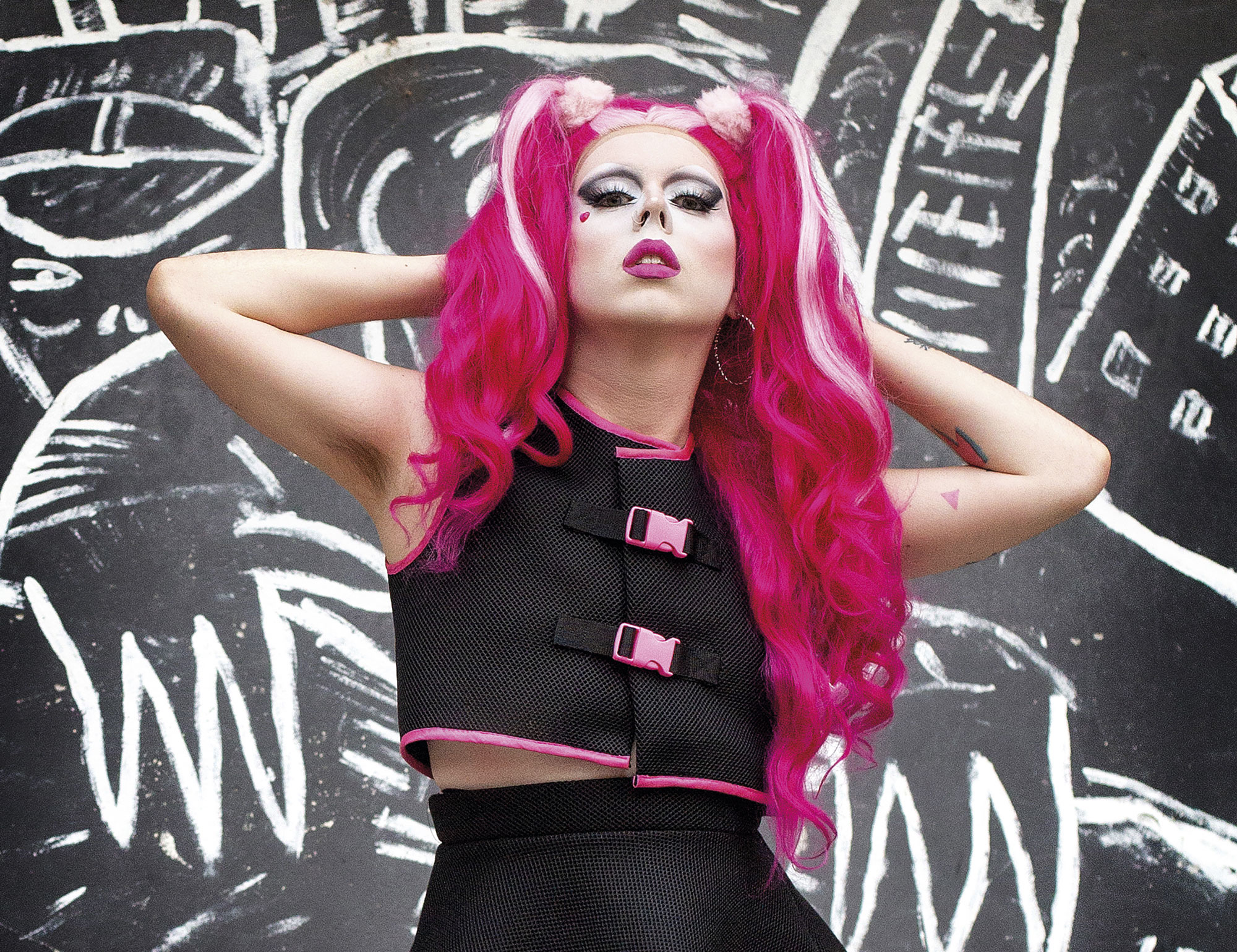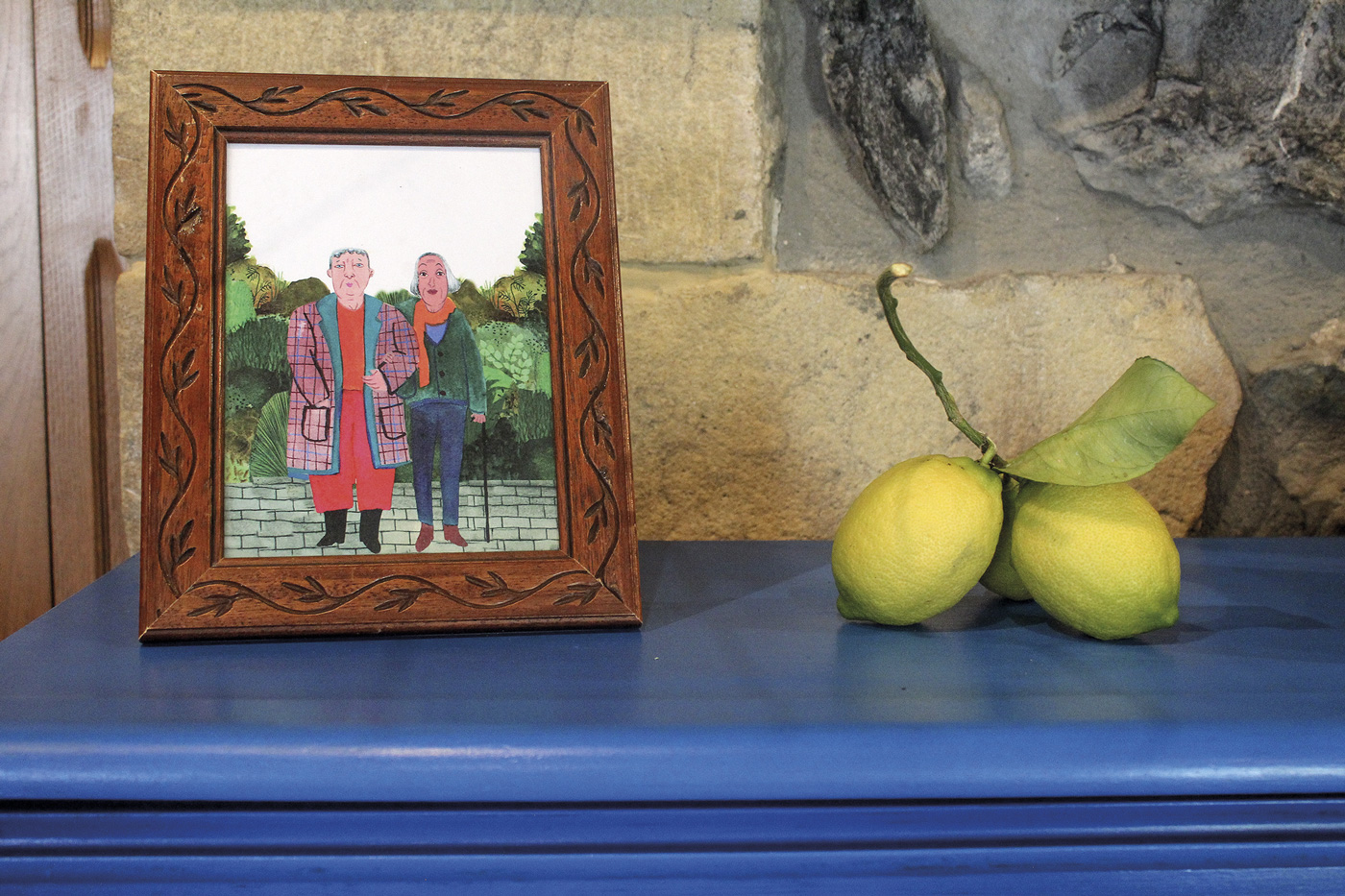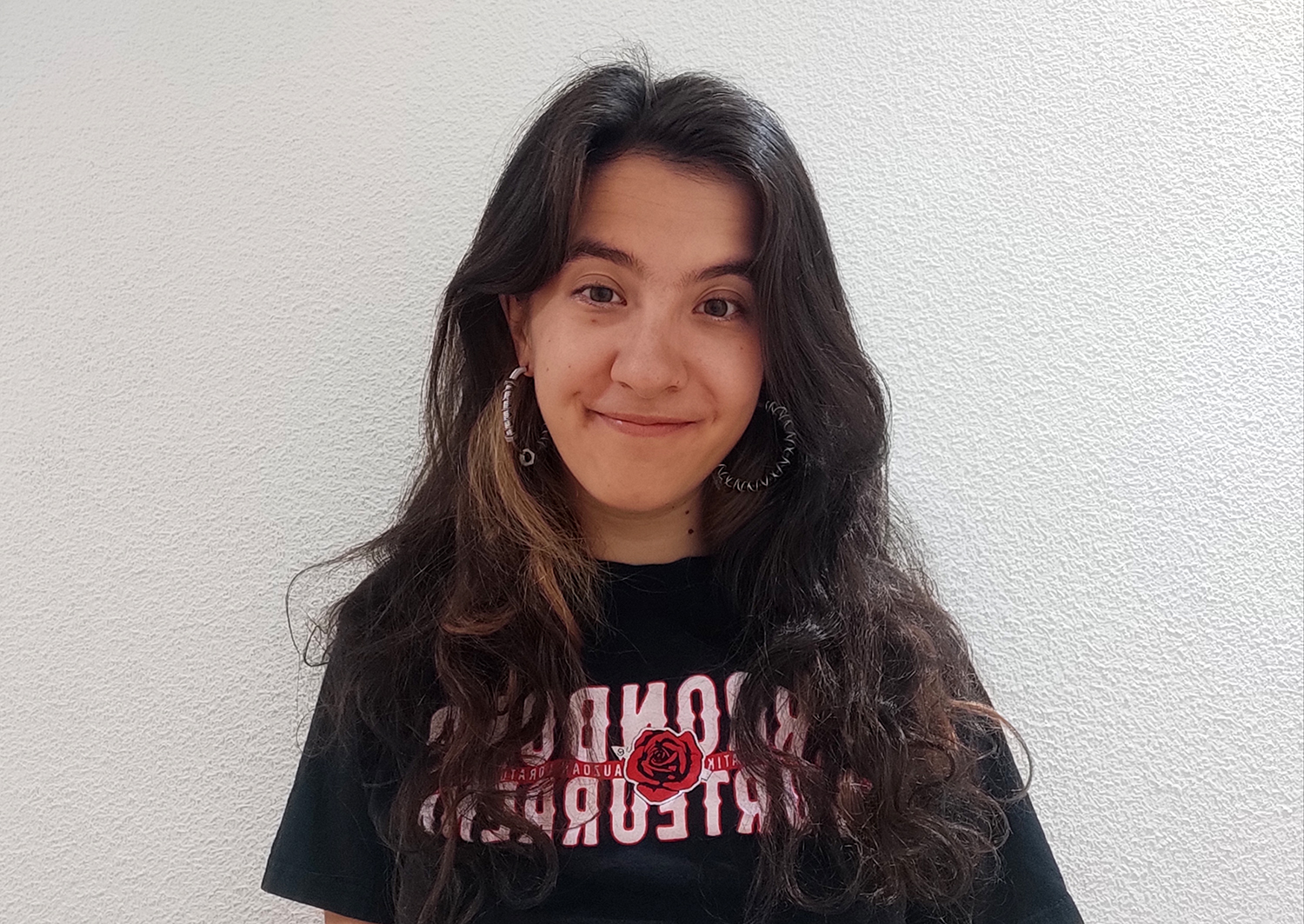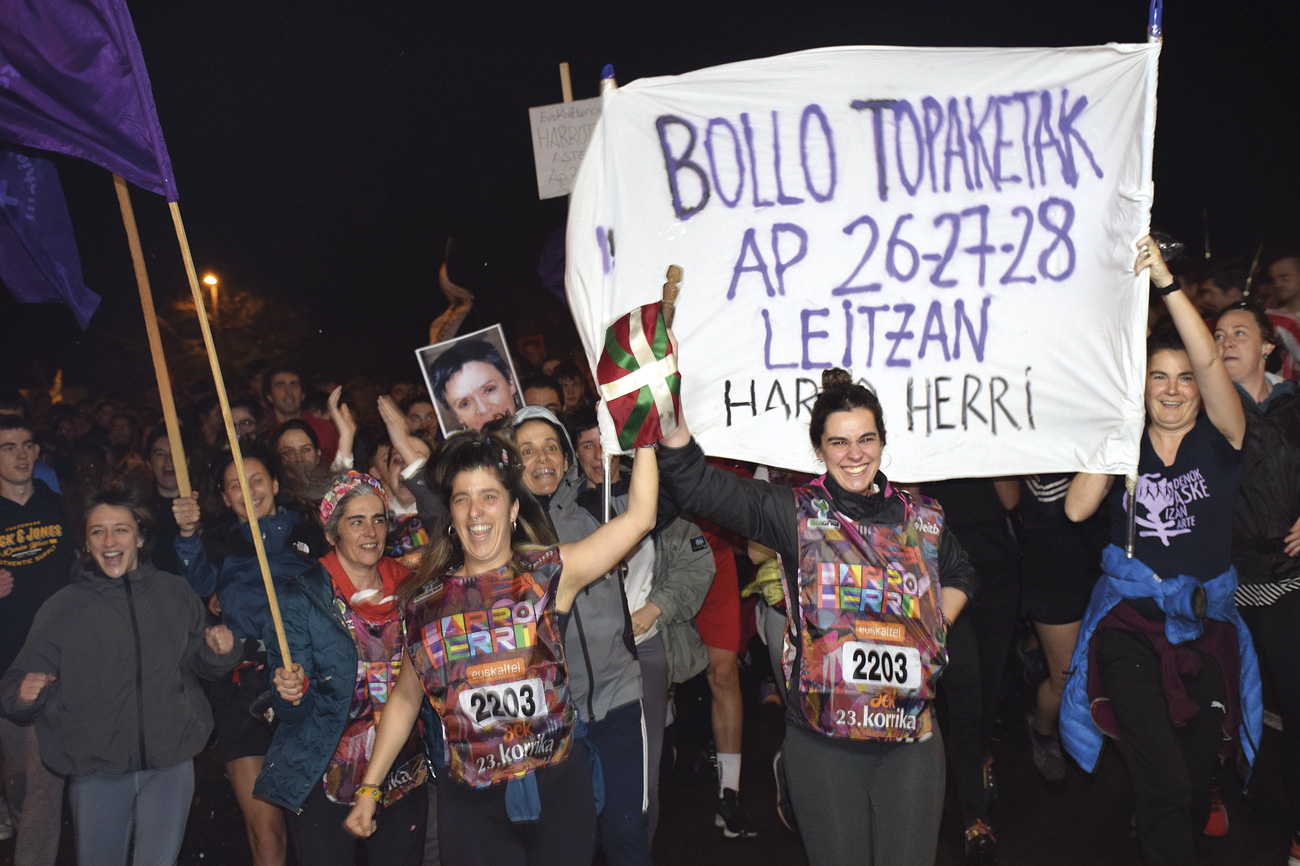"The message I make with the tank on stage can be as important as the message given in a congress."
- In recent years drag art has reached visibility and strength in the Region of Pamplona. Some local transvestites are opening the altar aloud to be free and one of them is the young Albina Stardust.

Albina Stardust izenez ezaguna den drag artista eta aktibista trabestia da. Itzulpengintza ikasketak egin zituen EHUn eta gaur egun lanbidez irakaslea da. ETBko Biba zuek! eta Piztu Telebista saioetako kolaboratzailea da. San Fermin jaietako Entzierroa saioan lehen aldiz kaleko erreportari gisa aritu da. Drag tailerrak, hitzaldiak eta ikuskizun ugari eskaintzen ditu Euskal Herriko beste drag batzuekin elkarlanean eta Mírame, Begira nazazu eta Tuli Tuli kantuen egilea da, azken hau, Yogurinha Borova eta Kepa Yecorarekin batera.
How did he start working?
I always say I was born travesti. From a young age, I wore a scarf from my sister and my mother's heels, and in front of my whole family, Lady Marmalade's show. I would enter the back of the couch and go out when my mother would play to make a full choreography. Then, in adolescence, the normative, the heterogeneous and the masculine appeared to people, but he continued to do things like dance at home. In college, when I was 18, I went to Vitoria to study Translation. The new site, the new people, everything was new and then I thought it was my chance. I bought the makeup and started testing it.
An LGTBI party was held in Iruñea in 2018. Yogurina Borova, Donatella Maní, Sussie Pussie and other transvestites from Pamplona were also going to participate and Donatella encouraged me to accompany me. What I used to do only at home, I showed it to others for the first time, and so Albina Stardust emerged. Yoghurt told me right away to make an Instagram account, because it was very necessary to move all of this, and even more so in Basque. It was wonderful and so far I have not stayed.
Has it also become your profession?
I'm a professor of profession, but I immediately started doing hen shows for women singles, here with Sussi and Donatella in Pamplona and an animator in Vitoria. Music, some game... You know, having fun and getting crazy, that's the goal. There I learned a lot and started to make money with my drag, and it is known that you see art differently when you make money. We continued with this and another show until the arrival of COVID-19. So I started doing interviews on TV and on the radios, You Must Be Beautiful! until we reach the session. In March last year, I participated as a guest and was later called a collaborator. I've been through the course since September.
In summer, I also worked on television, for example, after the Sanfermines’ enclosures, making interviews and reports in the streets of Pamplona. I am very contenta.Ademas my partner, Divine Comedy, is also a drag and we work together many times. It's fantastic!
We do different shows. At the beginning of July, for example, the City of Burlada organized the great Luma Travesti Fest, a wonder that calls us to give lectures, many of them in institutes and schools. We also work a lot in the villages. In the villages there is a little spark, a lot of need to take the pen out and free the people's posture. So we do fashion shows, similar contests -- we want people to experiment and release drag in our shows.
It is very important to work pride in rural areas. This year, in early June, we held a great meeting at Tafalla, organized and impressive by the LGTBIQ+ collective of Laia Centro. Visibility and essential referents in the villages.
In carnivals, premarital farewell…it’s common for people to see themselves as eye-catching women. Is it some kind of escape valve?
Of course! And that's what we want to achieve. Come and liberate people. Drag is a means of testing new things and living freedom. When people try drag, they know each other better and see what they like and what they don't. The reflection we want to promote is: Why have I felt so good at dancing with people and dare not play like that in my normal life? That also happened to me. When I was Eneko, I was shy, I didn't speak -- and as Albina I speak very willingly with everybody. Why when I go with some heels I'm like that and no heels? So began my reflection process and today Eneko and Albina are not two people, but the same person, but with different images. Drag helped me a lot to get to know me.
Albina is not a character, because it seems defined that I will disguise myself from something, and it is not. I release myself as Albina. I like to take the yellow hair and the butt bare, and for that I use drag. It is a way of liberating and not of hiding anything.
"Drag is a political instrument. A way to overcome gender duality and a claim to show what one is"
You manage to liberate and all the eyes of the environment…
Yes, of course. And we must seize it. The Lady Gaga technique I think is very effective: it carries a lookout to draw the attention of everyone and when it gets it sends a powerful message.
We must be clear that messages can be sent in many ways and not just in conferences serias.Necesitamos a bit of joy. I believe that the message I make in a scenario with the tank can be as important as the one given in a congress. In the end, it seems that seriousness gives importance to messages and it is not.
.jpg)
What message do you want to send?
A lot. Drag is a political instrument. The claim of a way to overcome gender duality and to be oneself. For example, when I'm on the street often young children, and not so young, ask me if I'm a kid. And that's the perfect opportunity to show something. I tell you that I am not a boy or girl, and that there are many others opciones.Ese is the message I want to convey, but always in a good way and enjoy it. It is a political action for us to take to the streets. We want people to ask and reflect. Being free isn't always easy, of course, but you have to dare.
You have a good level of self-esteem...
Yes and no. I also have my things and my insecurities. When I don't feel safe, I try to appear as if I were safe. I play a role until I believe that security.
LGTBI often says two teens live. Is that the case?
This happens many times and I have experienced it like this. When girls and boys start to bind and kiss, we LGTBI are completely excluded. We cannot say publicly what we feel and it is also difficult to establish relationships. Now there are applications, but it's hard. I didn't go to the party, for example, why? I felt out of place. Then, when we are liberated, our real adolescence begins, which is the time when we develop our identity and the time when we live in secret we begin to develop it later.
"I felt worse in Madrid than in Pamplona. Maybe it's because for me Pamplona is home and I feel that support, but I've had worse experiences in big cities."
Have you had support in the environment?
I do. It's been fantastic. My mother is my biggest follower. He sees me on TV, he comes to all the shows -- and my friend equals.
My friends are not the ones I met in high school, they are certainly also very nice people, but I looked for people with the same interests, and in that social media has helped me a lot. Now I've met most of my friends in Pamplona on Twitter. We must look for and secure spaces. Saying “Dare and go forward” is easy, but your parents may then kick you out of the house, beat you up, or put your friends aside from you forever. It's not easy. That's why we transvestites here in Pamplona are always trying to find safe spaces. In the Harrotu area, for example, we stand together or we will have a coffee or a party. Pride day, for example, has become the fashion week of transvestites in Pamplona. All together, discreet and wonderful.
In short, we want to create a community and help each other by creating safe spaces. Sometimes people have to change city or town, especially from towns to cities, seeking freedom.
.jpg)
The cities of Euskal Herria, however, are not large… Yes, but
I don’t know what to say. I felt worse in Madrid than in Pamplona. It may be because for me Pamplona is home and I feel that support, but I have had worse experiences in big cities, because there are a lot of people out there.
When children use it as pale insults, what do you feel?
I have a positive view, perhaps not entirely realistic, but positive. I have students wearing a LGBTI flag bracelet on fifth grade. Insults have always existed and let us hope that they will one day disappear, but I want to focus on progress and I see that young people come very prepared, not all, but many do. My personal opinion is that where there is Euskera, that respect is more evident, because the Basques, as a small community, understand what is oppression or feeling marginalized. And education work is also very effective. In Navarre, for example, excellent work is being done with the Skolae programme. That has to be done, but not just with children. It's very important to reach out to parents. Children should receive the same messages in society and at home, otherwise there are disruptions. If I tell you guys can wear their skirt, but then at home they tell them no, they're going to take care of the parents and not me.
Some fear talking to children about these kinds of issues. For a kiss your child will not become maritxu or bollera, quiet. We've seen thousands of hetero kisses and we're here. We will take real steps when it is generally recognized that this reality is there, and talking about it is not gender ideology or attempt to indoctrinate.
"They say that all opinions must be accepted, but if their "opinion" goes against it is not an opinion, but a discrimination"
Trans and LGTBI have recently passed a law to guarantee people's rights. What valuation do you make? It
is very important to advance the laws because most of the violence we receive from the institutions. We face many difficulties in completing questionnaires, in preparing documents…
On the other hand, the number of debates being held on things that are not debatable is enormous. But how should we discuss a reality? Who told you that you can have an opinion about a person's identity? They say that all opinions must be accepted, but if their “opinion” goes against it is not an opinion, but a discrimination. You cannot say that you believe trans women are men, for example. Trans women are women and period. That makes me angry.
We leave the prejudices and we will speak normally of the identities of others. I understand that this is a process and that information needs to be expanded, but today having to keep listening to some things is hard.

Do you feel assaulted or persecuted?
I'm quiet down the street, but sometimes as I walk around a few hetero crews, you run away! I'm careful. On the other hand, I hear insults like I hear them every day and I'm used to it.
However, we always show fuerte.En our shows
we want to show our strength and our positive aspects. LGTBI is a reality that, unfortunately, there are many hard and sad stories that look everywhere, but not the only one. Along with this, we have to prove that many LGBTI people live happily. It is very important to give young people positive references. I, for example, when I was little I was very worried about how I had to live as gay, without children, without a normal life… for me it was a kind of condemnation, which is what we are told.
Condemnation is still very harsh in many parts of the world. Here too, what is not heteronormatical, are we still linking with a subworld?
Yes. Transsexuality has always been linked to prostitution, and drag has also been linked to the night and the world of drugs, but not so. My motto is: Drag is everywehere is everywhere.
We must appear day and night, in Basque and Spanish, at home and on the street. We also need beautiful stories.
We don't live in an idyllic world, and we can't tell anyone that they're going to live like that. We have no capacity or need to avoid all suffering.
The important thing is to ensure that all people have the support to carry out the process that they have to do in the best possible way.
Of the record
Tuli Tuli
"It was called tuli-tuli to bind in the LGTBI collective, in the Pamplona of the 80's. Now they have recovered this concept Yogurinha Borova and Albina Stardust in their new song and music video with the lyrics of Kepa Yecora. An empowering speaker as funny as strong: “Join us. Don't miss your chance at Izan Marika Boll. Let's empower. Look forward. Open your eyes. Take the step. You're not the only one. We're in a dark bar. Look back. Make Tuli Tuli.”
.jpg)























